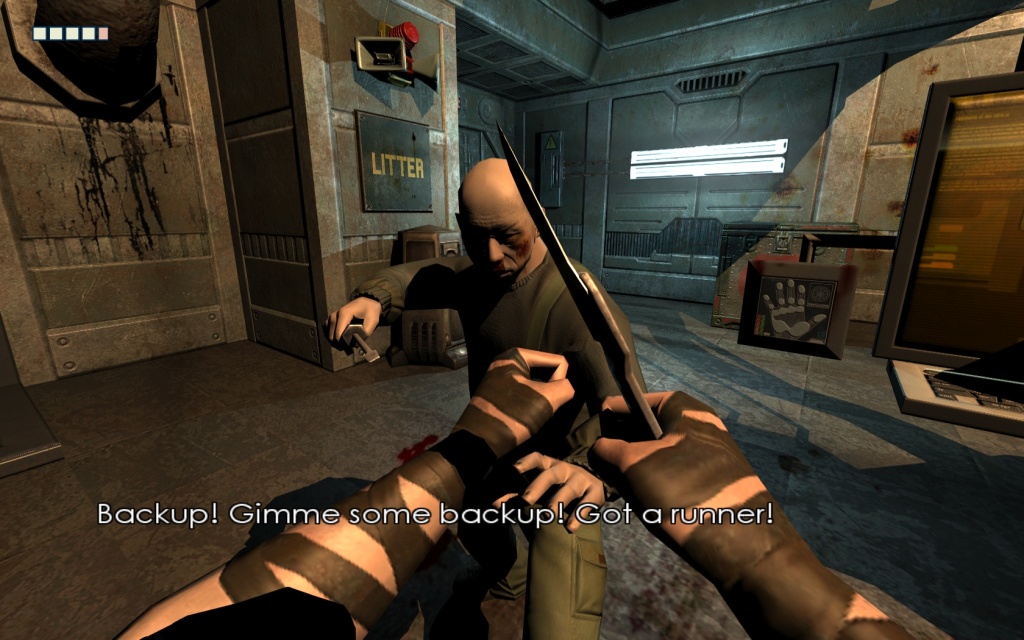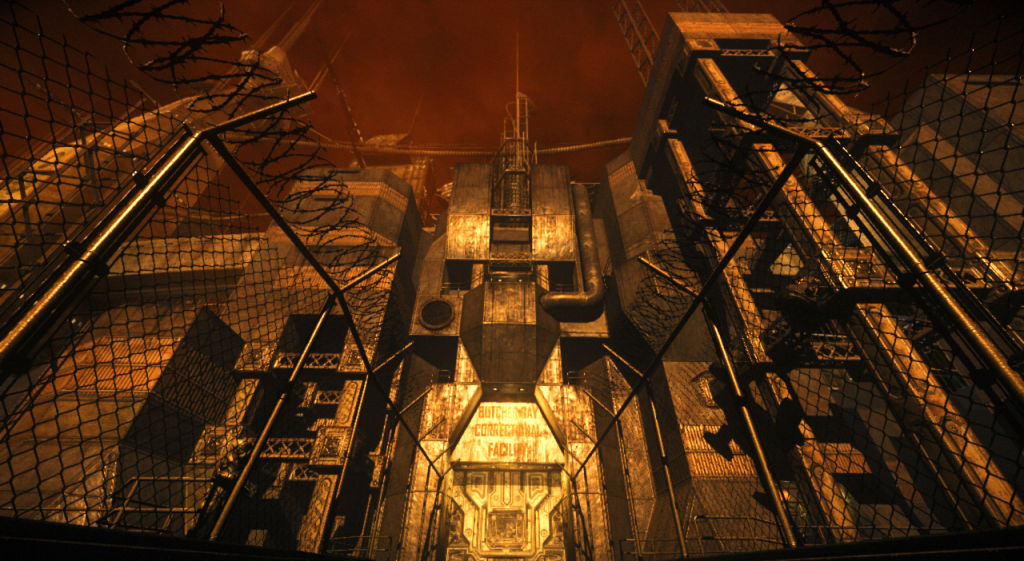Last updated on October 6, 2014
Part 1
Diesel’s newly established (at the time) Tigon Studios enlisted the aid of Swedish developer Starbreeze Studios, little known for anything but obscure action-RPG Enclave. Did you play it? I certainly didn’t. Unsurprisingly, Starbreeze wanted to turn Escape from Butcher Bay into a first-person role-playing game with you in the role of Riddick. Vestiges of that unnecessary complexity show through the so-called “Adventure” segments, pruned to a wonderful level of interactivity without bloat.
In the game, which throws you into a thematically consistent tutorial level before throwing you out into the world, the first real segment consists of talking to prisoners. What a strange idea for a so-called “first person shooter”! Mostly, you’ll learn to know your new inmate companions, the dynamics and power structures of the place, who wants who dead, and (obviously) how to escape. It’s strange to find yourself wandering around the prison as if in a pleasant social call. The atmosphere removes this feeling with the constant presence of guards and camera turrets, which will attack you at the slightest intimation towards violence or odd behavior (jumping up and down, for example, or maybe bludgeoning a guard).
Much of these segments, of which there are two, revolve around picking up quests (yes, quests in a first person shooter) along with collectibles (in the form of cigarettes). Quests mostly come down to things you were going to do anyway, appropriate for prison life: dispose of one person or another, obtain drugs for some wonderful patron, and related sub-tasks. You might think this sounds horribly boring, but it works from both a narrative and mechanical standpoint. What do you think prisoners do all day, anyway? Riddick’s obviously craftier than many of the other inmates, but he needs to prove himself to each group if he wants to get the help he needs to escape. Over time, you’ll find that your actions intimidate and earn the respect of everyone in close proximity.
Frequently, Riddick often employs the illusion of nonlinearity. The whole prison system sounds like the vestige of a role-playing game akin to BioWare’s work, and functions the same. You do what quests you want, when you want. However, Escape from Butcher Bay also presents no doubts to the player that it is, through and through, an action game. The game constantly bounces you from one genre to the next; the prison sequences may take a long while, but soon enough Escape from Butcher Bay will thrust you into a close range combat situation, or the need to remain stealthy, or even an arena-based fist fight. You never know what will happen and which quests will disappear and/or totally change within the span of a few minutes. It gives you the idea of freedom, which makes your actions feel all the more powerful. Almost all of your actions change the environment in some way, from your frequent escape attempts (soldiers talk about you if you listen in) to the whole dynamic of relationships.

Of course, earning respect from criminals comes less from Riddick’s intellect (he talks little) and mostly via violent means. As Riddick’s a violent man, Starbreeze’s vision does contain much of that. However, the traditional shooting segments don’t form the core of the experience; I can only count about an hour when you held lethal weaponry like assault rifles and shotguns, relative to the rest of the game’s reluctance to provide you with any suitable weaponry. Shivs and silence become your main weapons. The close-range fistfights (or shivs, or screwdrivers, or brass knuckles) work surprisingly like Punch Out! in the first person. Using combinations of the forward, left, right, and back keys will do different sorts of attacks (back and attack makes Riddick do an uppercut, for example), and these can be strung together to form simplistic combos. Apparently, they wanted to implement a separate fight mechanic or mode, but this interrupted with the flow of the game too much and restricted movement, breaking immersion. The first person perspective brings home the impact of punches as gore and blood fly out and bodies fall. I imagine that’s intentional. The same goes with ammo readouts on the guns, which don’t interfere with the heads-on display in any way.
You are, in fact, Riddick, and the game wishes for you to feel the consequences of being Riddick. You act as he acts, walks as he walks, and do the things he does. The most notable way you learn Riddick’s ways come from the stealth sequences, some of the best designed such mechanics that I’ve seen. Press the crouch button to go into stealth mode. Like any stealth game, the shadows remain your friend; helpfully, the game indicates whether you can be seen by changing the screen’s color to a bluish hue (for hidden) or an orange view (for being in plain sight). Guards, for the most part, react appropriately: if they see your shadow, even when hidden, they’ll attack. If you walk up without being in stealth mode, they’ll see you and attack. If you kill a guard loudly or fail to drag his body into the shadows, they will go on alert looking for you. When you don’t have weapons (or can’t, due to the story contrivance of DNA-encoded weapons), you’ll want to take care not to reveal yourself. You can kill guards, but you can also bypass a great deal of them.
In most situations, you’ll find that the level design gives you the option to do either/or. If you’re the run-and-gun type, options to do just that will present themselves (shotguns aren’t affected by DNA codes, so that works). If you’d rather strike from the shadows, up above or near them, that’s also a possibility. For me, I take the hybrid approach: kill what I can, and stealth kill everything (and I mean EVERYTHING) until the area’s clear. Perhaps this isn’t efficient, but I do it anyway. Heavy mech guards, of course, present a problem to an unarmed prisoner, but it’s possible to sneak right by the heavy monstrosities if necessary.
Furthermore, Starbreeze Studios augments all these elements through their wondrous graphical design (realistic for the time and still great today, especially the remake). The visuals and music lend a sense of foreboding and grime to everything in this maximum security prison placed on a hostile planet. A visit to the officer’s quarters shows that daily life for the guard isn’t much better than the prisoners they oversee. People continue in their daily lives, have conversations, and generally do normal human things. The music also changes dynamically based on the tension of any particular situation, really throwing you into the zone.

The best part, of course, is that Escape from Butcher Bay flows from one genre type to the next without so much as a blink. Surprisingly, it’s not just good at all these diverse elements, it’s FANTASTIC. Each one controls perfectly and works great. Even the shooting works well; Riddick isn’t the best shot, and much of these segments take place in narrow corridors, meaning that strafing and shooting will make you inaccurate. There’s a risk/reward to avoiding bullets and aiming accurately, as well as taking advantage of environmental hazards (hint: shoot fans in the air. This will work). The stealth controls work great, and I never felt that I couldn’t tell when I could or could not be seen (or snap some necks). Even the fist fights work perfectly and require knowing when to use defense or not. Some segments force you into complete darkness without the ability to see, and the notable eyeshine ability (see in the dark) adds yet another layer to prevent damage. They even throw this darkness segment right before the eyeshine unlocks to show you how useful this ability becomes in time.
Make no buts about it: Escape From Butcher Bay isn’t easy. Guns hurt like guns should hurt, and failing to avoid damage will lead to quick deaths. You need to master a variety of tools and techniques which the developers will frequently limit and/or provide, and each level will force the player out of their comfort zone multiple times. Riddick’s resourceful at his natural instincts, and so shall you once you’re done with the game. The end remains particularly satisfying as it turns into a constant shoot-out with a giant mech in your hands.
Still, even with its realism, it sacrifices nothing for the purposes of fun; that’s what makes that segment work, along with a host of others. It convinces you that you’re escaping a prison; you buy into the illusion of control, and let the level design, rules, and obstacles take care of the rest. You barely take a moment to notice the impeccable structure of the whole game, which tricks you into its ways and means without nary a notice from the player. According to Starbreeze, the player should feel that they’re in control, an active participant in events. This explains the relative dearth of cutscenes in the game, as they wanted to keep you “active” even when initiating conversations. They did not fail in this objective.
If there’s ever been a more effective brand of “role-playing”, I haven’t seen it. The sum total of the experience turns you into Riddick, and it’s exciting and engaging all the way until the end. If you ever wanted to play the life of a dastardly criminal in a high-tech science-fiction prison, Escape from Butcher Bay has it covered. Of course, it does contain a boatload of objectionable content for any Christian worth his/her salt, as well. 1 Corinthians 6 makes that obvious enough:
9 Or do you not know that the unrighteous will not inherit the kingdom of God? Do not be deceived; neither fornicators, nor idolaters, nor adulterers, nor effeminate, nor homosexuals, 10 nor thieves, nor the covetous, nor drunkards, nor revilers, nor swindlers, will inherit the kingdom of God. 11 Such were some of you; but you were washed, but you were sanctified, but you were justified in the name of the Lord Jesus Christ and in the Spirit of our God.
Riddick seems to go against everything we hold dear; why expose ourselves to such an experience?
